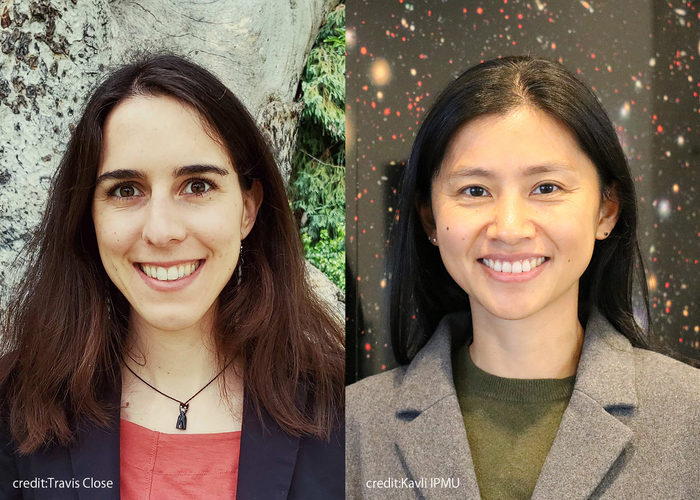The COVID-19 pandemic has had both positive and negative impacts on astronomy research, where overall the number of research papers being produced increased, but the number of new or junior researchers entering the field has dropped. The researchers who carried out the study also found that no single country’s female astronomers were able to be more productive than their male colleagues on average, suggests a new study in Nature Astronomy.

Credit: (from left) UC Berkeley Postdoctoral Fellow Vanessa Bohm (credit:Travis Close) and Kavli IPMU Project Associate Professor Jia Liu (credit: Kavli IPMU).
The COVID-19 pandemic has had both positive and negative impacts on astronomy research, where overall the number of research papers being produced increased, but the number of new or junior researchers entering the field has dropped. The researchers who carried out the study also found that no single country’s female astronomers were able to be more productive than their male colleagues on average, suggests a new study in Nature Astronomy.
In 2021, Project Associate Professor Jia Liu joined the Kavli Institute for the Physics and Mathematics of the Universe (Kavli IPMU) in Tokyo and settled into a new country and job in amidst a global pandemic.
”As a new mother and an early career scientist, my life has been heavily affected by the pandemic –– lost childcare, dropped productivity, disconnection from my colleagues, and a tough job market. While rebuilding my research and life routines, I couldn’t stop wondering: how are others in my field affected by the pandemic? Am I alone,” said Liu.
Collaborating with University of California, Berkeley, Postdoctoral Fellow Vanessa Böhm, the researchers decided to find out themselves after not finding the answers in the limited studies available at the time.
The computational cosmologists used their data mining skills to download more than 1.2 million records of astronomical publications since 1950. They wanted to analyze publication patterns by gender and country, but such information is confidential. So, the researchers assigned a gender probability to each author based on their given name and assigned a country based on the paper author’s affiliation or affiliations listed in their paper.
The results were surprising, said Liu.
Overall output in astronomy, measured by the annual paper count, had increased.
“While one may assume that COVID has mostly negative impacts on the world, this positive phenomenon may not be hard to understand: COVID-induced changes such as increased flexibility in work arrangement, reduced commutes and business trips, as well as improved virtual technologies, among others, are potentially favorable for conducting scientific research,” said Liu.
However, when the researchers looked into whether the positive outcome was result of more researchers entering the field, or an increase in individual productivity, they found the latter was mainly responsible for the trend.
“When we counted the average number of papers each researcher produced, we saw boosted individual productivity seen across most countries. Meanwhile, a decreasing number of incoming new researchers is seen in most of the countries we studied. This result indicates larger barriers for new researchers to enter the field, or for junior researchers to complete their very first project during COVID,” said Liu.
Finally, the researchers found the productivity of female astronomers was worst affected. Fourteen out of 25 countries studied saw a smaller fraction of papers written by women, and fewer women researchers entering the astronomy field. During COVID-19 so far, no female researchers were able to be more productive than their male colleagues, even in countries including the Netherlands, Australia, and Switzerland, where female researchers had been as productive as male colleagues before the pandemic.
The researchers say their data only studies trends over a limited period of time as the pandemic still continues. While they were able to study quantitative outputs during the pandemic, the quality of these papers is yet to be studied.
Details of this study were published in Nature Astronomy on 28 November.
Journal
Nature Astronomy
DOI
10.1038/s41550-022-01830-9
Article Title
Impact of the COVID-19 pandemic on publishing in astronomy in the initial two years
Article Publication Date
28-Nov-2022




